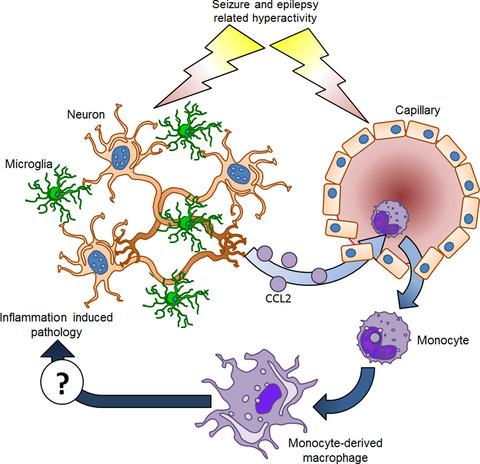Our official English website, www.x-mol.net, welcomes your
feedback! (Note: you will need to create a separate account there.)
Neuroimmune interaction in seizures and epilepsy: focusing on monocyte infiltration.
The FEBS Journal ( IF 5.5 ) Pub Date : 2020-05-30 , DOI: 10.1111/febs.15428 Dale B Bosco 1 , Dai-Shi Tian 2 , Long-Jun Wu 1, 3, 4
The FEBS Journal ( IF 5.5 ) Pub Date : 2020-05-30 , DOI: 10.1111/febs.15428 Dale B Bosco 1 , Dai-Shi Tian 2 , Long-Jun Wu 1, 3, 4
Affiliation

|
Epilepsy is a major neurological condition that affects millions of people globally. While a number of interventions have been developed to mitigate this condition, a significant number of patients are refractory to these treatments. Consequently, other avenues of research are needed. One such avenue is modulation of the immune system response to this condition, which has mostly focused on microglia, the resident immune cells of the central nervous system (CNS). However, other immune cells can impact neurological conditions, principally blood‐borne monocytes that can infiltrate into brain parenchyma after seizures. As such, this review will first discuss how monocytes can be recruited to the CNS and how they can be distinguished from there immunological cousins, microglia. Then, we will explore what is known about the role monocytes have within seizure pathogenesis and epilepsy. Considering how little is known about monocyte function in seizure‐ and epilepsy‐related pathologies, further studies are warranted that investigate infiltrated blood‐borne monocytes as a potential therapeutic target for epilepsy treatment.
中文翻译:

癫痫和癫痫的神经免疫相互作用:集中于单核细胞浸润。
癫痫病是一种主要的神经系统疾病,影响着全球数百万人。尽管已经开发出许多干预措施来减轻这种状况,但是很多患者对这些治疗都难以忍受。因此,还需要其他研究途径。一种这样的途径是调节免疫系统对这种疾病的反应,这种疾病主要集中在小胶质细胞,小胶质细胞是中枢神经系统(CNS)的固有免疫细胞。但是,其他免疫细胞也会影响神经系统疾病,主要是血液传播的单核细胞,在癫痫发作后会渗入脑实质。因此,本文将首先讨论如何将单核细胞募集到中枢神经系统,以及如何将它们与免疫表亲小胶质细胞区分开。然后,我们将探索有关单核细胞在癫痫发病机理和癫痫中的作用的已知信息。考虑到对癫痫和癫痫相关病理中的单核细胞功能了解甚少,因此有必要进行进一步的研究,以调查浸润的血源性单核细胞作为癫痫治疗的潜在治疗靶点。
更新日期:2020-05-30
中文翻译:

癫痫和癫痫的神经免疫相互作用:集中于单核细胞浸润。
癫痫病是一种主要的神经系统疾病,影响着全球数百万人。尽管已经开发出许多干预措施来减轻这种状况,但是很多患者对这些治疗都难以忍受。因此,还需要其他研究途径。一种这样的途径是调节免疫系统对这种疾病的反应,这种疾病主要集中在小胶质细胞,小胶质细胞是中枢神经系统(CNS)的固有免疫细胞。但是,其他免疫细胞也会影响神经系统疾病,主要是血液传播的单核细胞,在癫痫发作后会渗入脑实质。因此,本文将首先讨论如何将单核细胞募集到中枢神经系统,以及如何将它们与免疫表亲小胶质细胞区分开。然后,我们将探索有关单核细胞在癫痫发病机理和癫痫中的作用的已知信息。考虑到对癫痫和癫痫相关病理中的单核细胞功能了解甚少,因此有必要进行进一步的研究,以调查浸润的血源性单核细胞作为癫痫治疗的潜在治疗靶点。











































 京公网安备 11010802027423号
京公网安备 11010802027423号